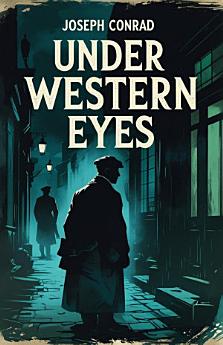Under Western Eyes
Jul 2025 · BEYOND BOOKS HUB
Ebook
312
Pages
reportRatings and reviews aren’t verified Learn More
About this ebook
Under Western Eyes is Joseph Conrad’s gripping and psychologically rich political novel, first published in 1911. Set against the backdrop of Tsarist Russia and European revolutionary movements, the novel explores themes of betrayal, identity, and moral ambiguity with the signature depth and psychological insight for which Conrad is renowned. The story follows Razia Razumov, a young Russian student in St. Petersburg who becomes unwillingly entangled in a web of revolutionary intrigue when a fellow student assassinates a government official and seeks refuge in Razumov’s apartment. In a moment of panic and desperation—seeking to preserve his own future—Razumov betrays the fugitive to the authorities. This fateful act sets in motion a dramatic narrative that takes Razumov to Geneva, where he finds himself among exiled revolutionaries, including the sister of the man he betrayed. Narrated by an unnamed Westerner—an English teacher in Geneva—the novel is deeply critical of both autocratic tyranny and revolutionary fanaticism, offering a nuanced look at the clash between Russian political ideals and Western liberalism. Conrad masterfully portrays the inner torment of Razumov as he is consumed by guilt, alienation, and the impossibility of redemption. Unlike Conrad’s seafaring novels, Under Western Eyes delves into the urban world of politics and espionage, sharing kinship with Dostoevsky’s Crime and Punishment in its psychological complexity. The novel is also a commentary on how the “Western eye” struggles to interpret and empathize with the Eastern European experience, reflecting Conrad’s own dual heritage as a Polish-born writer who adopted English as his literary voice.
About the author
Joseph Conrad (1857–1924) was a Polish-British writer regarded as one of the greatest novelists in the English language. Born in Ukraine under Russian rule, he became a British citizen and wrote complex, modernist narratives exploring colonialism, identity, and moral conflict. His major works include Heart of Darkness, Lord Jim, and Nostromo. Conrad's experiences as a sailor and outsider shaped his deeply introspective literary style.
Rate this ebook
Tell us what you think.
Reading information
Smartphones and tablets
Install the Google Play Books app for Android and iPad/iPhone. It syncs automatically with your account and allows you to read online or offline wherever you are.
Laptops and computers
You can listen to audiobooks purchased on Google Play using your computer's web browser.
eReaders and other devices
To read on e-ink devices like Kobo eReaders, you'll need to download a file and transfer it to your device. Follow the detailed Help Center instructions to transfer the files to supported eReaders.








